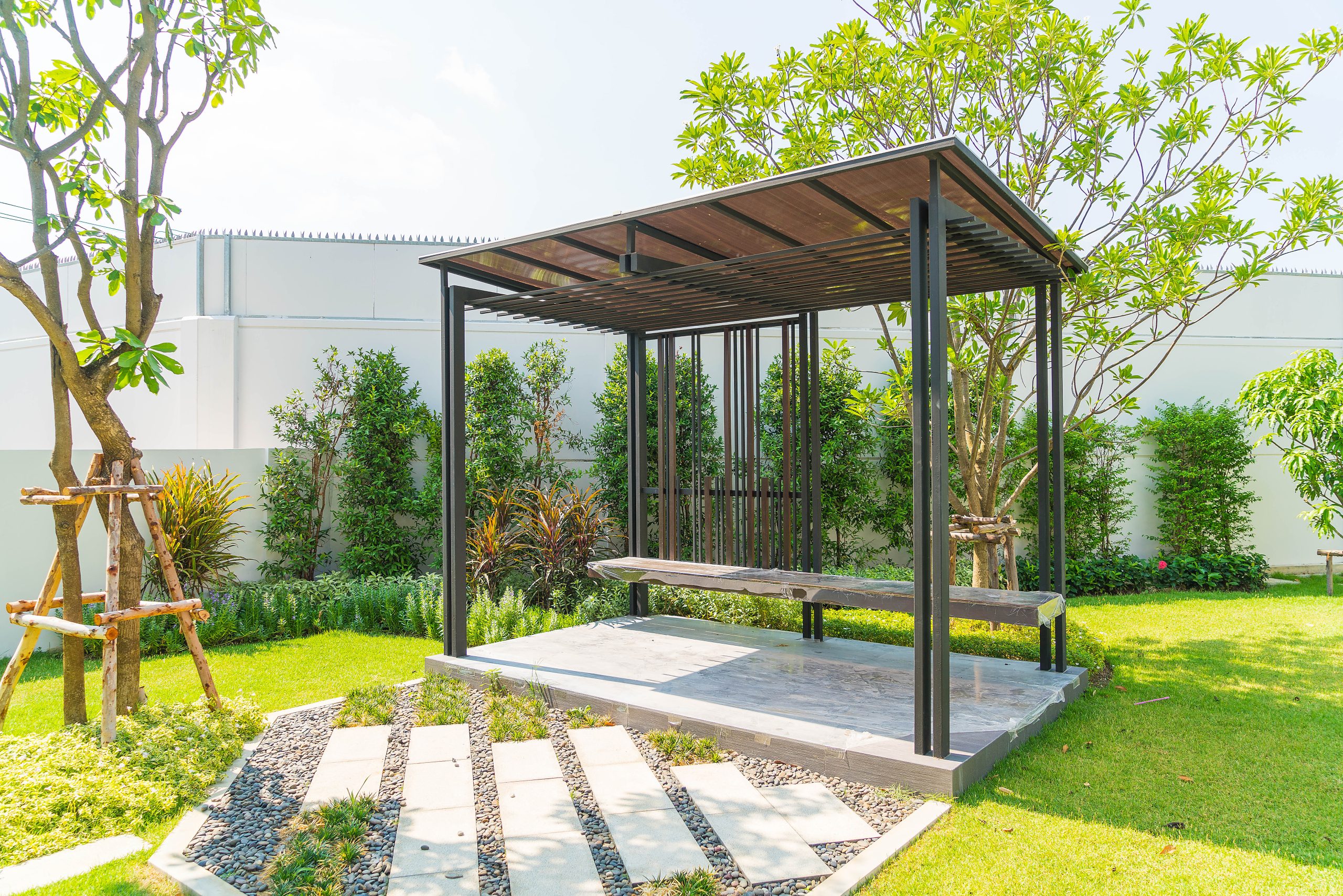Plants have always been an important part of our lives, and they have numerous benefits beyond their aesthetic value. Not only do they purify the air we breathe, but they can also create a positive and calming environment in our surroundings. The energy emitted by certain plants can have a profound effect on our mood and mental wellbeing, helping to reduce stress, anxiety and depression.
In this blog, we will explore the plants that are known to create positive energy in your surroundings. From beautiful flowers to lush green foliage, there are many plants to choose from that can help improve your overall well-being. We will also discuss the science behind these plants and how they can positively impact your life.
Whether you are looking to create a peaceful environment in your home or office, or simply looking for ways to enhance your mental and emotional health, adding these plants to your surroundings can be a great way to achieve these goals. So, join us as we explore the best plants for creating positive energy and discover the benefits they can bring to your life.
According to Vastu Shastra, the ancient Indian system of architecture and design, certain plants are believed to have positive effects on the energy flow and ambiance of a home.
Here are some plants that are considered good as per Vastu:
Tulsi Plant
Tulsi or holy basil is considered a sacred plant in Indian culture and is believed to bring positive energy and good luck. It is often grown in the front or backyard of a home.
Tulsi, also known as holy basil, is a sacred plant in Hindu culture and has been used for its medicinal properties for centuries. It is native to India and is grown widely in South Asia, Southeast Asia, and other tropical regions.
Tulsi is an aromatic plant with green leaves and purple flowers. It has a strong, pleasant scent and is used in various forms in traditional Ayurvedic medicine. It is rich in antioxidants and has immune-boosting properties that help the body fight against infections and diseases.
In Hindu culture, Tulsi is considered a sacred plant and is often worshipped in households and temples. It is believed to have spiritual and religious significance and is associated with various deities.
Tulsi can be consumed in various forms such as tea, capsules, and extracts, or can be grown at home and used fresh. It is easy to grow and care for and can be grown in pots or directly in the ground. Tulsi requires well-drained soil, plenty of sunlight, and regular watering. It is also important to ensure that the plant is protected from pests and diseases.
Overall, Tulsi is a highly beneficial plant that can help to improve overall health and well-being. It is widely used in traditional medicine and is also considered a sacred plant in Hindu culture.
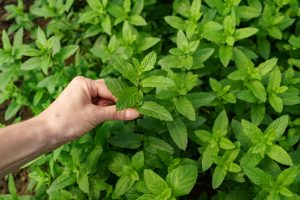
Money Plant
The money plant is believed to bring wealth and prosperity to a home. It is often grown indoors and can be trained to climb walls or trellises.
Money plant, also known as Devil’s ivy, is a popular indoor plant that is believed to bring good luck and prosperity, according to the principles of Feng Shui and Vastu Shastra. It is a low-maintenance plant that is easy to grow and care for, making it a popular choice for both experienced and novice gardeners.
The money plant has long, trailing stems with heart-shaped leaves that can grow up to several feet long if given adequate support. It is often grown in hanging baskets or trained to climb up a trellis or wall. The plant is native to Southeast Asia and is widely grown as an ornamental plant in gardens and indoors.
Apart from its reputed ability to bring wealth and prosperity, the money plant also has a number of other benefits. It is an effective air purifier and can help to improve indoor air quality by removing toxins and pollutants from the air. It is also known to be a natural stress reliever and can help to create a calming and relaxing environment in the home or office.
To care for a money plant, it is important to ensure that it is placed in a bright, indirect light and is watered regularly, but not over-watered. The plant prefers a well-drained soil and should be fertilized once a month during the growing season to promote healthy growth.
Overall, the money plant is a highly beneficial plant that is not only believed to bring good luck and prosperity, but also has a number of other benefits such as air purification and stress relief. It is a low-maintenance plant that is easy to grow and care for, making it a popular choice for many indoor gardeners.
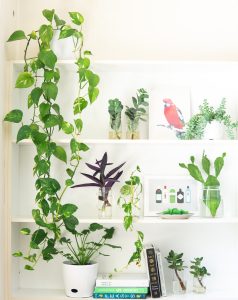
Bamboo Plant
Bamboo is believed to bring peace, harmony, and good luck. It is often grown in the backyard or garden.
Bamboo is a type of fast-growing, woody grass that is native to many parts of the world, including Asia, Africa, and the Americas. There are many different species of bamboo, ranging in size from small, decorative plants to towering trees that can reach over 100 feet in height.
Bamboo is a highly versatile plant that has a wide range of uses, including construction, furniture, paper production, and food. In addition, bamboo is also a popular ornamental plant that is often grown indoors or in outdoor gardens.
One of the main benefits of growing bamboo as an ornamental plant is that it is a fast-growing and low-maintenance plant. Bamboo is known for its ability to grow quickly and can reach maturity in just a few years, depending on the species. It also requires very little care, as it can grow in a variety of soil types and does not require frequent watering or fertilization.
Bamboo is also known for its aesthetic appeal, with its long, slender stems and lush green foliage. It is often grown in containers or planted in the ground to create a natural screen or barrier. In addition, some species of bamboo have been traditionally used in Asian cultures as symbols of good luck, prosperity, and strength.
Overall, bamboo is a highly versatile plant that can be used for a wide range of purposes. It is easy to grow and care for and has many aesthetic and cultural benefits, making it a popular choice for indoor and outdoor gardens alike.
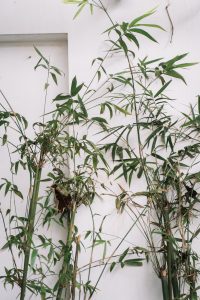
Neem
Neem is believed to have medicinal properties and is also considered a purifier. It is often grown in the backyard or garden.
The neem tree (Azadirachta indica) is a tropical plant that is native to the Indian subcontinent, but is also grown in other parts of the world such as Africa and the Middle East. The neem plant has long been valued for its medicinal and insecticidal properties, and is considered to be a highly useful plant in traditional Ayurvedic medicine.
The neem plant has many uses, both medicinal and non-medicinal. The leaves, seeds, bark, and roots of the neem tree are all used for various purposes. The leaves of the neem plant, for example, are used to treat skin conditions such as acne, psoriasis, and eczema, as well as to treat digestive problems and infections. The seeds of the neem plant are used as a natural pesticide, as they contain a chemical called azadirachtin that repels insects.
In addition to its medicinal and insecticidal properties, the neem plant is also valued for its environmental benefits. It is a fast-growing tree that can thrive in arid and semi-arid conditions, making it an ideal choice for reforestation projects in dry regions. The neem plant also has a deep root system that helps to prevent soil erosion and improve soil fertility.
Growing a neem plant is relatively easy, as it can tolerate a wide range of soil types and growing conditions. It prefers well-drained soil and requires regular watering, especially during the early stages of growth. The neem plant can be grown from seed or from cuttings, and can be pruned to control its size and shape.
Overall, the neem plant is a highly beneficial plant that has many medicinal, environmental, and practical uses. It is a valuable addition to any garden, and is a popular choice for those interested in natural remedies and sustainable agriculture.
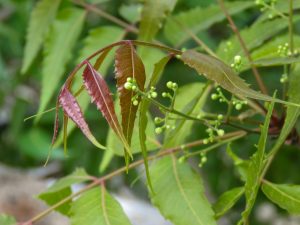
Jasmine Tree
Jasmine is believed to bring happiness and positivity to a home. It is often grown in the front or backyard of a home.
Jasmine is a popular plant known for its fragrant, delicate white, yellow, or red flowers. It is native to tropical and subtropical regions and is widely cultivated as an ornamental plant. There are many different species of jasmine, including common jasmine (Jasminum officinale), Arabian jasmine (Jasminum sambac), and star jasmine (Trachelospermum jasminoides).
In addition to its aesthetic appeal, the jasmine plant also has a range of benefits. Here are some of the benefits of growing jasmine plants:
- Aromatherapy: The fragrance of jasmine is widely used in aromatherapy and perfumery. The scent is believed to have a calming effect on the mind and body, and can help to reduce stress and anxiety.
- Medicinal properties: Jasmine has a long history of use in traditional medicine, and is believed to have a range of health benefits. For example, jasmine tea is used in Chinese medicine to help treat digestive problems and relieve stress.
- Insect repellent: Jasmine has natural insect-repellent properties, and can help to keep mosquitoes and other insects at bay. This makes it a useful plant to grow in areas with high insect populations.
- Natural air freshener: The fragrance of jasmine is a natural air freshener, and can help to keep your home smelling fresh and clean. You can place jasmine plants in various parts of your home to enjoy the fragrance and improve air quality.
- Attracting wildlife: Jasmine plants are a favorite of butterflies and bees, and can help to attract these pollinators to your garden. This can help to support local biodiversity and contribute to a healthy ecosystem.
Overall, jasmine plants are a beautiful and fragrant addition to any garden or home. They offer a range of benefits, from aromatherapy and medicinal properties to insect repellent and natural air freshening. Whether grown as an ornamental plant or used for their natural properties, jasmine plants are a versatile and useful addition to any landscape.
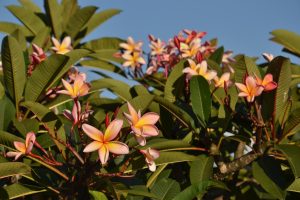
Aloe Vera
Aloe Vera is believed to have healing properties and is also considered a purifier. It is often grown indoors or in the backyard.
Aloe vera is a succulent plant known for its fleshy, spiky leaves that contain a gel-like substance. It is native to North Africa and is now widely cultivated in many parts of the world for its medicinal and cosmetic uses.
Here are some of the benefits of growing aloe vera plants:
- Medicinal properties: Aloe vera is widely used in traditional medicine for its anti-inflammatory and healing properties. It is used to treat a range of skin conditions, such as sunburn, acne, and eczema, and is also used to promote healing of wounds and burns.
- Aids digestion: Aloe vera juice is used as a natural remedy for digestive problems such as constipation, bloating, and irritable bowel syndrome. The plant’s high water content and natural enzymes help to soothe and heal the digestive tract.
- Improves air quality: Aloe vera plants are natural air purifiers, and can help to improve the quality of air in your home or office. They remove harmful pollutants such as benzene and formaldehyde from the air, making it safer and more breathable.
- Cosmetic uses: Aloe vera is widely used in the cosmetic industry for its moisturizing and healing properties. It is a common ingredient in lotions, creams, and other skincare products, and can help to soothe and hydrate dry or damaged skin.
- Easy to grow: Aloe vera is a low-maintenance plant that is easy to grow both indoors and outdoors. It requires very little watering and can thrive in a range of temperatures and light conditions.
Overall, aloe vera plants are a versatile and useful addition to any home or garden. They offer a range of health and cosmetic benefits, and are easy to care for and grow. Whether used for its medicinal properties or its air-purifying capabilities, the aloe vera plant is a valuable addition to any plant collection.
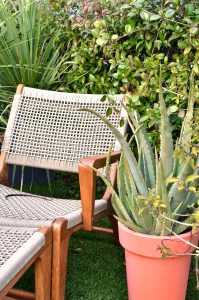
Coconut Tree
The coconut tree is considered a symbol of good luck and prosperity. It is often grown in the backyard or garden.
The coconut tree, also known as the “tree of life,” is a tropical plant that is native to many parts of the world, including the Philippines, India, and South America. It is known for its versatile uses, ranging from food and drink to building materials and fuel. Here are some of the benefits of growing coconut trees:
- Food and drink: The coconut is a highly nutritious food that is rich in fiber, vitamins, and minerals. It is used in a range of dishes and cuisines, and can be consumed fresh or dried. The coconut also produces coconut milk, which is a popular ingredient in many recipes, as well as coconut water, which is a refreshing and hydrating drink.
- Building material: The coconut tree is used in many parts of the world as a building material. The trunk can be used for timber and construction, while the leaves are used for thatching roofs and making baskets and other woven items.
- Soil erosion prevention: Coconut trees have deep roots that can help to stabilize soil and prevent erosion. They are often planted along coastal areas to protect against storm surges and other natural disasters.
- Renewable energy: The coconut tree produces copra, which is the dried kernel of the coconut, and is used to produce coconut oil. Coconut oil can be used as a fuel for cooking and lighting, and can also be used in the production of biodiesel.
- Medicinal uses: The coconut tree has a range of medicinal uses, and is used in traditional medicine to treat a variety of ailments. The coconut oil is used to treat skin conditions such as eczema and psoriasis, while the water is used as a natural diuretic.
Overall, the coconut tree is a highly versatile and valuable plant that offers a range of benefits. Whether used for its nutritious food and drink, building materials, or medicinal properties, the coconut tree is a valuable addition to any tropical garden or landscape.

It is important to note that the ideal plants for a particular home may vary depending on the specific energy needs and design goals of the space. Additionally, other factors such as climate and soil conditions can also impact the health and growth of plants.

